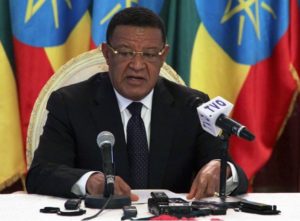By Nick Turse, The Intercept
“A WARM FRIENDSHIP connects the Ethiopian and American people,” U.S. Secretary of State Rex Tillerson announced earlier this year. “We remain committed to working with Ethiopia to foster liberty, democracy, economic growth, protection of human rights, and the rule of law.”
 Indeed, the website for the U.S. Embassy in Ethiopia is marked by press releases touting U.S. aid for farmers and support for public health infrastructure in that East African nation. “Ethiopia remains among the most effective development partners, particularly in the areas of health care, education, and food security,” says the State Department.
Indeed, the website for the U.S. Embassy in Ethiopia is marked by press releases touting U.S. aid for farmers and support for public health infrastructure in that East African nation. “Ethiopia remains among the most effective development partners, particularly in the areas of health care, education, and food security,” says the State Department.
Behind the scenes, however, Ethiopia and the U.S. are bound together by long-standing relationships built on far more than dairy processing equipment or health centers to treat people with HIV. Fifteen years ago, the U.S. began setting up very different centers, filled with technology that is not normally associated with the protection of human rights.
In the aftermath of 9/11, according to classified U.S. documents published Wednesday by The Intercept, the National Security Agency forged a relationship with the Ethiopian government that has expanded exponentially over the years. What began as one small facility soon grew into a network of clandestine eavesdropping outposts designed to listen in on the communications of Ethiopians and their neighbors across the Horn of Africa in the name of counterterrorism.
In exchange for local knowledge and an advantageous location, the NSA provided the East African nation with technology and training integral to electronic surveillance. “Ethiopia’s position provides the partnership unique access to the targets,” a commander of the U.S. spying operation wrote in a classified 2005 report. (The report is one of 294 internal NSA newsletters released today by The Intercept.)
The NSA’s collaboration with Ethiopia is high risk, placing the agency in controversial territory. For more than a decade, Ethiopia has been engaged in a fight against Islamist militant groups, such as Al Qaeda and Shabab. But the country’s security forces have taken a draconian approach to countering the threat posed by jihadis and stand accused of routinely torturing suspects and abusing terrorism powers to target political dissidents.
“The Ethiopian government uses surveillance not only to fight terrorism and crime, but as a key tactic in its abusive efforts to silence dissenting voices in-country,” says Felix Horne, a senior researcher for Human Rights Watch. “Essentially anyone that opposes or expresses dissent against the government is considered to be an ‘anti-peace element’ or a ‘terrorist.’”
In February 2002, the NSA set up the Deployed Signals Intelligence Operations Center – also known as “Lion’s Pride” – in Ethiopia’s capital, Addis Ababa, according to secret documents obtained by The Intercept from the whistleblower Edward Snowden. It began as a modest counterterrorism effort involving around 12 Ethiopians performing a single mission at 12 workstations. But by 2005, the operation had evolved into eight U.S. military personnel and 103 Ethiopians, working at “46 multifunctional workstations,” eavesdropping on communications in Somalia, Sudan, and Yemen. By then, the outpost in Addis Ababa had already been joined by “three Lion’s Pride Remote Sites,” including one located in the town of Gondar, in northwestern Ethiopia.
“[The] NSA has an advantage when dealing with the Global War on Terrorism in the Horn of Africa,” reads an NSA document authored in 2005 by Katie Pierce, who was then the officer-in-charge of Lion’s Pride and the commander of the agency’s Signal Exploitation Detachment. “The benefit of this relationship is that the Ethiopians provide the location and linguists and we provide the technology and training,” she wrote. According to Pierce, Lion’s Pride had already produced almost 7,700 transcripts and more than 900 reports based on its regional spying effort.
Pierce, now a lieutenant colonel in the Army Reserve and a lawyer in private practice, had noted her role with the NSA’s Ethiopia unit in an online biography. When contacted by The Intercept, she said little about her time with Lion’s Pride or the work of the NSA detachment. “We provided a sort of security for that region,” she said. The reference to the NSA in Pierce’s online biography has since disappeared.
Reta Alemu Nega, the minister of political affairs at the Ethiopian Embassy in Washington, D.C., told The Intercept that the U.S. and Ethiopia maintained “very close cooperation” on issues related to intelligence and counterterrorism. While he did not address questions about Lion’s Pride, Alemu described regular meetings in which U.S. and Ethiopian defense officials “exchange views” about their partnership and shared activities.
Read more: How the NSA built a secret surveillance network for Ethiopia
Source: The Intercept


